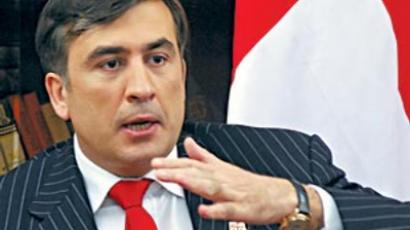Hard choices helped save people's lives – Medvedev
Twelve months after the war in South Ossetia, Russia’s President has been reflecting on the decisions he had to make.
In a candid interview with NTV channel, he confessed he will never forget that night last August, and, while the choice was difficult, he is proud of what was done.
Dmitry Medvedev: I believe the memory of what happened on the night of August 7, 2008, will always remain the most vivid and at the same time the most dramatic of my life. I remember vividly what was going on, my phone conversations with the Defense Minister who reported to me on the current situation, and the sequence of our decisions, our responses to the outrageous aggression that was committed on the night of August 7, 2008. Each time I remember these events, each time I rewind this tape, so to say, I realize that on the one hand, we had no other choice in that situation. On the other hand, the events were unfolding under the worst-case scenario, probably, the most sorrowful scenario. There are few such episodes in the life of any person, especially of a head of State, and it is probably right because such decisions are hard, let alone their consequences.
As I go over the events of last August, particularly of that night, I recall that until the last minute we believed that the Georgian regime had enough integrity, decency or at least reason not to make terrible mistakes that would take a heavy toll and have the most dramatic geopolitical impact. Unfortunately, this was our misjudgment. The regime of Saakashvili eventually made those mistakes, which led to a criminal act and brought losses – huge losses – of human life. Hence, the Russian Federation had to hastily respond to them, thus preserving hundreds and thousands of lives and restoring peace in the Caucasus that was at serious risk.
Recalling that night, that difficult situation constituted a personal choice, an important moment of reflection, a moment of weighing the pros and cons, as I was the only one to take all decisions. Consultations facilitate nothing, as the only person, the President, is responsible for all decisions and steps taken. That was in fact what occurred that night. While the Defense Minister kept me informed, I assessed the information and made decisions. It was, probably, the hardest thing, but, eventually, we did the right thing. We did exactly what we had to do. The decisions that I made as the Supreme Commander-in-Chief were effective. And above all – they helped save people's lives.
As I recall that night, I think that generally our country acted in a responsible and decent manner, although it was quite a challenge. I am not ashamed of those days, since it was a very important period for our State and we chose our way – we acted fairly and responsibly.
I had never been to Tskhinval before my first official presidential visit to the new country, the Republic of South Ossetia. The situation there is very complex, indeed. The population of the Republic is very poor, and lots of problems and challenges have accumulated during almost two decades of the blockade. However, both the South Ossetian people and their leadership are willing to deal with these problems. Certainly, we will help them in addressing these problems, we will implement support and aid programmes and develop investment projects. We will protect the security of this State—or rather help them to protect their security, as well as assist them in addressing a number of pressing economic issues. So, basically all these issues are now our common responsibility, as South Ossetia and Russia have concluded a special treaty, a treaty of friendship, mutual assistance and military cooperation, and now we are going to deal with all these issues. Like it or not, we will develop full-scale relations with both South Ossetia and Abkhazia. For us, it is not a matter of political expediency; these are the decisions that we have made and that we will implement.
As for the people's attitude, it is special. I can say openly that it was very important to me because when I arrived I saw their faces, and I saw how much they thought of Russia and how they welcomed the President of the Russian Federation. One can say or write many different things about this, but it is impossible to express the real emotions, which, in fact, are very simple – it’s the sense of gratitude and the feeling that Russia stood up for this small nation. To feel that, one has to be there with those common people and to talk to those who have come out onto the streets, with tears in their eyes and the feeling of gratitude, though a year has already passed since those tragic events. I will never be able to forget that.













